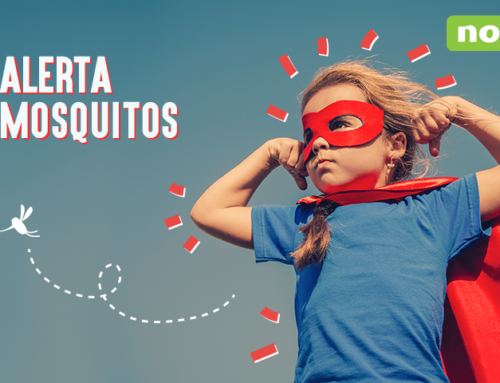Maybe it happens to you or your children that, when you are in a group, the mosquitoes will bite you, but not those who are with you.
Have you ever wondered why mosquitoes prefer some people and not others? Is it blue blood or sweet blood? Does it have to do with charisma and love for animals? Nothing like that, it's much simpler.
Scientific research explains the factors that influence mosquito preferences.
At Nosa Healthcare we summarise the most important ones for you to take into account when avoiding their bites.
The colour of clothes
This is one of the easiest elements to control in order to avoid mosquito bites. Apparently these insects are sensitive to colour spectra. Black and red fabrics attract them, so avoid them if you know mosquitoes are around.
Excessive sweating
One way to avoid the mosquito bites while we sleep is by taking a shower before going to bed.
The smallest drop of sweat on your skin is a magnet for mosquitoes. Substances such as lactic acid, ammonia, carboxylic acids and uric acid present in sweat are easily recognised by these insects.
Sweaty bodies from several days or very sweaty clothes - typical in summer - leave a trail that mosquitoes love to follow. Therefore, te recommend removing hangers with clothes that are already used inside the bedroom.
And that also explains why outdoor sportsmen and sportswomen or children, when they play and get soaked in sweat, are a favourite target for their bites. However, it is also true that depending on genetic and lifestyle factors, the concentration of these substances in body fluids varies considerably from person to person.
The blood group
Mosquitoes, even without biting you, are able to detect what your blood type is.
They find the O group appetising, and then the B group. Scientific studies have confirmed that 85 % of people secrete a chemical signal through their skin that indicates which blood type they have. The 15 % who do not, are the individuals on whom mosquitoes are least likely to land.
Emissions of carbon dioxide (CO2)
These tiny insects are able to detect CO2 even when they are 50 metres away. So if you're in a room and you see a mosquito on the wall, he knows you're there. And if it likes you, it will wait patiently for you to get lost and relax before it bites you.
Another vulnerable group are pregnant women in late pregnancy. They emit 21 % more carbon dioxide. They are therefore more likely to be bitten by mosquitoes.
The bacterial fauna of your skin
Research confirms that the types and amount of bacteria on human skin also play a role. Having large amounts of a few types of bacteria on the skin is more attractive to mosquitoes than having many bacteria of various types.
The amount of bacteria on the skin is multifactorial. It depends on the environment we live in, our state of health, our body hygiene, our age, etc... As basic advice, it is necessary to maintain proper hygiene.
An anti-mosquito genetics
There are people, and the reasons for this are still being investigated, whose genetics are not attractive to mosquitoes. It is as if they do not exist for these insects.
If you are not part of this privileged group, you need to take action. Especially in the summer, mosquitoes swarm. You need to have repellents and mosquito nets at hand in your home or if you are travelling.
Now that the mystery of why some people get bitten by mosquitoes and others don't has been solved, protect yourself and your family.







Leave A Comment
You must be logged in to post a comment.